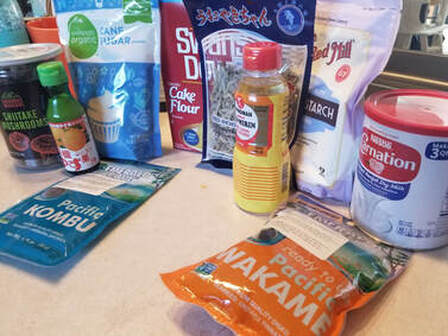 Originally Posted March 5,2020 in the Archive This month has already been a challenge in terms of cooking from our cookbook of the month. I know when i initially posted about my choice, I knew that sourcing the ingredients would be a problem for me and probably most of my readers. Most of the traffic here comes from the Midwest if my Facebook commenters are any indicator, and the Midwest is not the most friendly location in the world to find specialty dried seaweeds at the supermarket. Any specialty grocer could be as much as two hours away if you want to drive. So, how do we conquer this hurdle when we want to take on a cuisine as challenging as that of Japan? There is always Amazon. We use it for everything, and now that they are partnered with Whole Foods, folks in bigger cities can even use it for their everyday groceries. My first weekend researching this month’s cookbook, I spent more than fifty dollars on Amazon in order to source some of the core ingredients mentioned within the first few pages of the book. It’s fast, and it’s easy. When their boxes arrived in my mailbox, however, I wondered if there was a better way that I had honestly just ignored up until now. We give so much business to Amazon as a country when there are surely better ways to support smaller businesses. In the three years that I’ve been working on cookbooks, I’ve found that most of the writers do the leg work for you if you want to go beyond the giant internet overlord which has wormed their way into literally everything that we do. I’ve just taken the easy way out. Sonoko Sakai is one of those authors that is mindful of the limitations of the modern American grocery store, and she provides a lovely selection of links in the back of the cookbook to help guide you on your way. This time, we explore the long route. I am blessed enough to live in a decently populated area with a large Asian immigrant population that may or may not have what I need in their grocery stores. Not many of these appear to be Japanese focused, but we’ll explore them all the same while we cook our way through Japanese Home Cooking. The eastern side of downtown has a small cluster all close together that I intend to get to later this week. There are also those websites that Sonoko Sakai has so graciously compiled for her readers. Some of the websites in that section are as simple as the King Arthur Flour website, and most of us can get that in our everyday stores. Some of the listed websites don’t actually ship to homes across the country but rather serve to draw attention to Japanese Markets in larger cities. Among the handful that I spot checked, The Japanese Pantry is the most promising. The prices, however, will muscle out anyone who hasn’t dedicated themselves to pursuing this type of cooking. I can get a bottle of kikkoman soy sauce at my local store for maybe two bucks. It’s not the highest quality, but it’s accessible. The high quality Mitsuboshi soy sauce available at the Japanese pantry is thirty-one dollars! It’s clearly the good stuff, directly imported, but my god. The money. Amazon doesn’t sell Mitsuboshi soy sauce, so there isn’t a price point comparison to be made here. As for the suribachi (specialized Japanese mortar and pestle kind of thing), the Japanese Pantry sells one for thirty-five dollars from a respected vendor in Japan. You can purchase what is almost certainly a suribachi of lesser quality on amazon for about twenty bucks. The price differential isn’t that large, but its enough to give anyone pause. It’s the unfortunate reality that adventurous home cooks face when they try to branch out into something that isn’t widely practiced in the United States. We are not all so privileged as to live in places like New York or Los Angeles with large immigrant populations of nearly every ethnicity selling the flavors of home. The rest of us have two options: give our money to Bezos, or spend sometimes twice as much time and money sourcing quality ingredients from smaller vendors.
0 Comments
Leave a Reply. |
The Mission An idea born in Normal, Illinois, Eating Normal hopes to chronicle the eating Experiences of a Red bird. Pledge monthly to our patreon! Archives
May 2024
Categories
All
|
 RSS Feed
RSS Feed